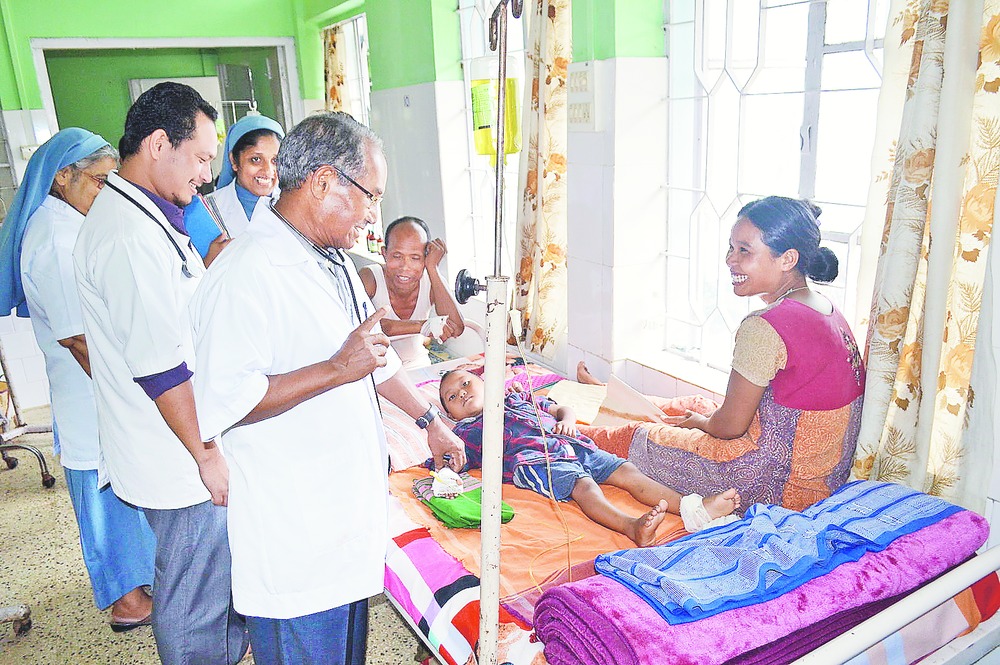
Tura, July 4: At least five public health centres (PHCs) in Meghalaya's Garo hills, that were ailing for nearly eight years, have today been nursed back to health with the untiring efforts of an NGO engaged by the state government.
In November 2008, the NGO Bakdil was asked to run five PHCs in remote areas of Garo hills under the public-private partnership (PPP) mode. The institutions were transferred to Bakdil in March 2009.
The PHCs are in Siju and Rongara in South Garo Hills, Wageasi and Gabil in North Garo Hills, Babadam in West Garo Hills and Salmanpara in South West Garo Hills.
"The almost abandoned rural health facilities have become alive and are fully functional. Proper planning and monitored implementation using culturally tailored methodologies actually improved utilisation of health services," said Fr Sunny Joseph Mavelil, director and secretary of Bakdil, a Catholic missionary-run social organisation.
Fr Mavelil said the Bakdil team, comprising nuns, doctors and other staff, stay with the rural poor all through the year with minimal facilities and motivate the villagers to avail of proper health services.
"The status of healthcare in the hilly terrain of Garo hills truly demands mission-mode intervention," he said. "At present, people have total confidence in the services provided by our five PHCs. In the next few years, we aim to achieve 100 per cent result with regard to all parameters linked to health indicators," Fr Mavelil said.
A visit to PHCs at Salmanpara, Babadam and Wageasi bears testimony to Bakdil's service to the people of Garo hills.
Most PHCs have recorded 100 per cent institutional birth. Deaths from malaria (the Garo hills region is notorious for this) and diarrhoea have been reduced.
"We have been motivated by the sisters (nuns who run the health centre) to ensure that pregnant women come for institutional delivery. Many pregnant women were earlier reluctant because of communication barriers and absence of doctors. We have motivated the villagers that the PHCs are run by sisters of Bakdil, who are available round-the-clock and have managed to bring the patients to the PHCs," said Winalish Sangma, an Asha worker in the Upper Arai Apal village of Wageasi in North Garo Hills.
The five PHCs had to function against all odds - inaccessible villages, long hours of frequent power disruption, illiteracy among the community, apathy of government officials, lack of proper roads and communication facilities and irregular fund flow, among others. But today things have changed for the better at these PHCs.
The premises of the health centres are clean and people avail of the services offered. These PHCs do not have specialists or high-end technical infrastructure. They function like any other PHCs of Meghalaya with basic minimum facilities.
In running the PHCs of Garo hills, Bakdil has demonstrated that with conviction and courage anything is achievable. Crozier Sangma, a retired government doctor who works for Bakdil at the Wageasi PHC, said, "Everything moves slowly in government departments. If we fail to deliver there is no action taken. But in Bakdil, things are different. We ensure that health services are offered to all."
Sangma said prior to the taking up of Wageasi PHC by Bakdil, there were only four recorded institutional deliveries between 2001 and February 17, 2009.
In the last seven years, at Wageasi alone, there were more than 1,300 plus institutional deliveries.
Social organisations and pressure groups have time and again expressed resentment over the poor healthcare services at government-run healthcare centres. Amid this scenario, Bakdil has proved to be an agent of change.











